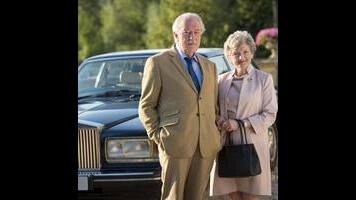Although J.K. Rowling’s The Casual Vacancy shares certain themes with her celebrated Harry Potter series—both contain the story of a tragic kid who grows up without the help of parents—the lack of magic in the former took some of the charm out of her storytelling prowess. Whereas Harry is told he’s special by a half-giant and whisked away from his nasty aunt, uncle, and cousin to a world of wonder, The Casual Vacancy’s Krystal Weedon must live in the perpetual oppression of a rundown house with no father, a drugged-out mother, and a toddler brother to watch out for. Now adapted for television by Sarah Phelps (Oliver Twist), the story plays out on the screen much like it did on the page—reality hits hard, with no bright fantasy elements to cover up a few notable flaws.
The HBO miniseries, which originally aired on BBC One in February, is split into three hour-long parts set in the fictional idyllic town of Pagford. As most fictional idyllic towns come, Pagford is actually home to plenty of social and geopolitical strife—namely over Sweetlove House, a 200-year-old community center that serves the needy. Led by Howard and Shirley Mollison (the former played by Dumbledore himself, Michael Gambon), the older generation wants to turn it into a spa that “puts Pagford on the map,” whereas lawyer Barry Fairbrother makes a strong plea to stay committed to Sweetlove’s crucial community outreach programs. When the universally admired Barry drops dead at the age of 40, the town plunges a little too predictably into a three-way race for his open council seat, paving the way for an A-plot that has trouble establishing real stakes.
The pettiness and obsession with perception that ensue do a fine job of painting how trivial the issues facing Pagford’s elite are, but that’s part of the problem. Not enough time is spent in the muckier parts of town to establish the effect that turning Sweetlove into a cash-grabbing spa would have on its community. The show excels when it cuts from the adults’ squabbling and social climbing directly into Krystal’s dark reality, and newcomer Abigail Lawrie easily turns in the best performance as the troubled, foul-mouthed teen. Phelps smartly chooses to place a heavier focus on Krystal than Rowling does in the book, but perhaps not enough so. The show sometimes groans under the weight of its many characters, several of which don’t feel fully developed, even with some lesser players given little dialogue and others being cut from the novel entirely.
Despite its faults, when The Casual Vacancy works, it works well. The teenage characters’ “quest for authenticity” as a defiant youth nicknamed “Fats” puts it, evokes the genuine realism that Rowling likely sought with her book. It’s perhaps best captured by Krystal’s blunt summation of Barry’s death to his acne-ridden nephew: “It’s shit. Like, proper shit.”
Also true to reality is the totally separate, yet parallel islands the teens occupy in relation to their parents and other adult figures. Whereas they’re mostly written off as stupid, lazy, or disgraceful by their elders, it’s the adults who more often descend into moodiness, self-doubt, and petty fighting. This behavior is ironically charged largely by the kids themselves, who take to an internet forum to reveal dirty secrets about the candidates under the the username Ghost_Of_Barry_Fairbrother. The gossip is cleverly read as a voice-over by Rory Kinnear’s Barry himself, maintaining his saintly status throughout the three episodes.
The show pulls humor out of its dark material in this fashion when it can, dropping choice lines like “Kierkegaard is dripping with ejaculate” after Fats and Krystal go for a quick handjob in the school library’s philosophy section, and having council candidate Miles Mollison stuff his mildly horrified face with food in nearly every scene he appears. There’s some fun to be had with the ridiculous level of pomposity in Pagford, and director Jonny Campbell makes sure to maximize the opportunities when they arrive.
However, with a climax that The Casual Vacancy clearly wants to come off as emotionally heavy, the humor should serve as a brief escape from the overbearing sense of dread felt during Krystal’s darker scenes with the degenerate drug dealer Obbo, her heroin-addicted mother, and their social worker, Kay. Instead, those powerful moments are lost in the jumble and too loosely tied to the duller election plot and dark laughs it occasionally provides. The show sets itself up with a lot of potential, but can’t keep all its plates spinning fast enough or long enough to result in a true spectacle.

 Keep scrolling for more great stories.
Keep scrolling for more great stories.
